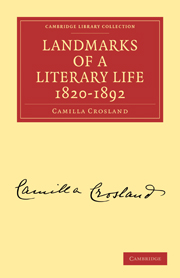Summary
A more interesting person, to me, however, than Major Cartwright, or even the great Rothschild, was the well-known actress, Mrs. Davison—the Miss Duncan who for many years held sway as the exponent of what was called “genteel comedy.” She was our near neighbour, and my mother and she were great friends, while her two sons were the playmates of my younger brother E.; my playmates, or, at any rate, child-companions, also, I might say, for they were not boisterous boys. The elder, James, became the celebrated musical critic of the Times, and I recollect the old five and a half octaves piano, on which—not till he was advanced in his teens—he first learned to play. As all who knew him must remember, he was lame, a misfortune which was the consequence of an accident in infancy, his nurse having let him fall, and concealed an injury that he received until too late to repair it.
I confess to having some faith in what is called a desultory education. I believe it often suits genius remarkably well. I cannot say I remember distinctly the details of the education of the two Davisons—they seemed to be often at home, and perhaps for a portion of their boyhood only attended a day school. But I do well recollect that James was a devourer of books, even at eleven or twelve years of age.
- Type
- Chapter
- Information
- Landmarks of a Literary Life 1820–1892 , pp. 43 - 57Publisher: Cambridge University PressPrint publication year: 2010First published in: 1893

